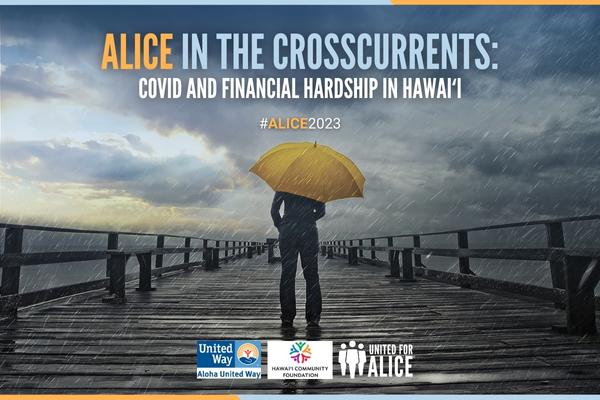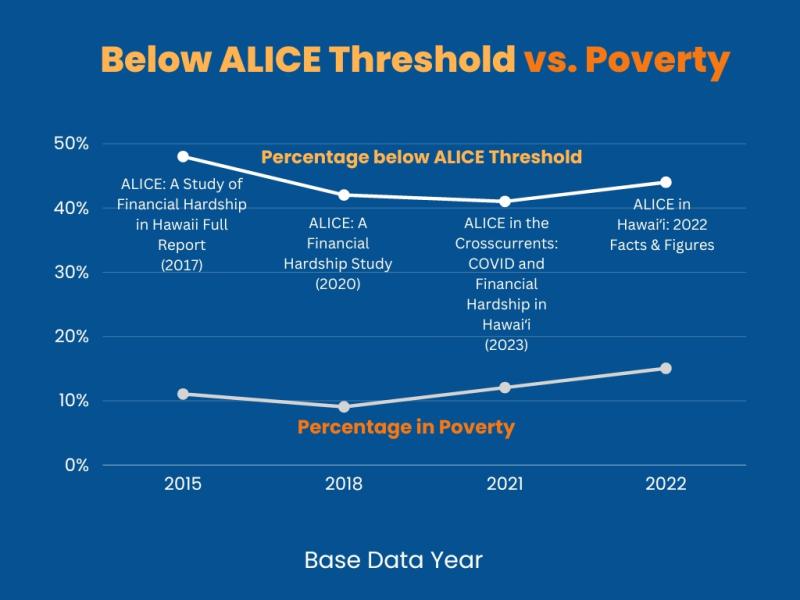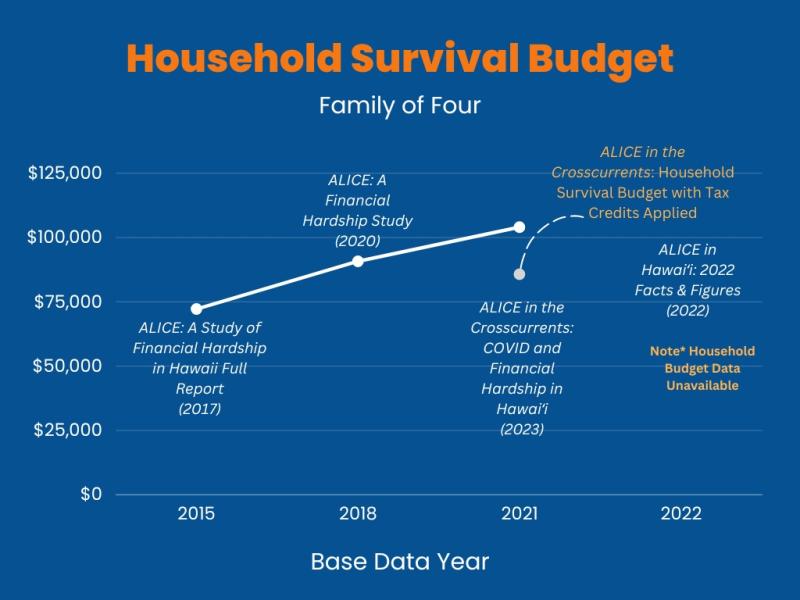
ALICE Research Reveals a Path Forward
The ALICE Initiative provides an invaluable framework for policymakers and stakeholders to improve conditions for struggling families in Hawaii. The new body of research draws attention to dramatic cost of living increases, rising debt load, and an alarming increase in the percentage of households living in poverty after the COVID-19 pandemic. The data underscores the need to reduce household expenses, increase wages, and enable struggling households to retain more of their income.
News Release from Aloha United Way, May. 10, 2023
HONOLULU – The Hawaiʻi Community Foundation (HCF) and Aloha United Way (AUW) partnered in 2022 to lead the ALICE Initiative and the ALICE Cohort’s work to address the financial insecurity and hardship experienced by 44% or nearly half of all local households. This newly released report, ALICE in the Crosscurrents: COVID and Financial Hardship in Hawaiʻi was based on the 2021 American Community Survey (ACS) data, the first ACS data available since the start of the pandemic and prepared in partnership with United for ALICE’s national team of researchers, a local Research Advisory Committee, and Aloha United Way staff.
In December 2022, Aloha United Way also released ALICE in Hawaiʻi: 2022 Facts & Figures, based on locally collected 2022 data made possible with support from Bank of Hawaiʻi Foundation. AUW was the only United Way to produce a 2022 update, and thus Hawaiʻi has the most comprehensive and timely data available. The 2022 Facts & Figures report is also referenced in the Crosscurrents research.
Used together, these reports provide critical data to understand the post-pandemic economy and identify trends that local households are experiencing. The combined reports provide a clear call to action for our community.
ALICE is an acronym for Asset Limited, Income Constrained, Employed, and is a way to describe people in Hawaiʻi who are working but whose income barely covers essential expenses, with little to no safety net for emergencies. During the pandemic, most of our essential workers were ALICE. Households below the ALICE Threshold include both ALICE and those in poverty. The first ALICE study released in Hawaii, based on 2015 data, identified 48% of households fell below the ALICE Threshold. In 2022, that number was 44%. However, the percentage of those below the Threshold who are in poverty saw staggering growth. Between 2018 and 2022, the number of households living in poverty increased from 9% to 15%. “Many ALICE Households were always one financial crisis away from poverty and some of our worst fears as a community have been realized. Families who were barely able to make it before COVID-19 couldn’t weather the impact of the pandemic, inflation, and the wild cost of living increases,” said John Fink, President and CEO of Aloha United Way.

One of the most telling data points is the change in Household Survival Budget or estimate of the minimum total cost of household essentials. This figure includes housing, childcare, food, transportation, taxes, but not things like auto repairs, travel, or entertainment.
In 2015, the Household Survival Budget for a family of four was $72,336 and the most recent figure from 2021 data, sets that number at $104,052 (before tax credits are applied).
The Household Survival Budget drops to $85,812 when tax credits are applied, illustrating the significant impact that tax credits can have on a household's bottom line.
The difference for a family of four (two adults and two children) is $18,240 annually, underscoring the immense impact that tax credits can have on households below the ALICE Threshold.
According to the latest data, between 2019 and 2021 there was a 3% increase in the Federal Poverty Level (FPL), but an $18% increase in the ALICE Household Survival Budget for a family of four and a 26% increase in the budget for a single adult in Hawaiʻi.
- 2017 ALICE: A Study in Financial Hardship in Hawaiʻi Household Survival Budget is $72,336
- 2020 ALICE in Hawaiʻi: A Financial Hardship Study Household Survival Budget is $90,828
- 2023 ALICE in the Crosscurrents: COVID and Financial Hardship in Hawaiʻi Household Survival Budget is $104,052*
- $104,052 Household Survival Budget drops to $85,812 when CTC (Child Tax Credit) and CDCTC (Child and Dependent Care Tax Credit) are applied

“The impacts of the rapid increases in the cost-of-living rise for households in Hawaii is wide-reaching and deeply concerning. The ALICE Cohort, Aloha United Way, and many advocacy organizations worked last year to achieve minimum wage increases. Even with those historic increases and an important package of expanded tax credits just approved this session, our State still needs more significant and rapid action to build financial stability for families and to prioritize residents in housing efforts if we truly want the families who call Hawaiʻi home to continue to live and work here. The ALICE reports clearly show this gap in income and costs,” said Suzanne Skjold, Chief Operating Officer of Aloha United Way.
ALICE Initiative partners, AUW and HCF, as well as ALICE Cohort members, are focused on a strategy that reduces household expenses, increases wages and assets, and allows for families to keep a greater percentage of their income. Credit packages like the Earned Income Tax Credit (EITC) and the Child Tax Credit (CTC) could bring thousands of dollars back into local households. Both recent ALICE reports show that credits like these make a significant difference to a household’s bottom line. Current advocacy work supports increasing earned income tax credit impact and eligibility. The recently passed package of credits, which pulled from two bills proposed by Governor Green as well as the House Majority Bill provide an update to the refundable food/excise tax credit, expand the state’s refundable Earned Income Tax Credit to 40% of the federal credit, expand rental assistance for kūpuna and expand accredited daycare options that will allow more parents to return to work.
“The ALICE Initiative is focused on reducing household costs, increasing eligible household participation in available credit programs, and in the continued development of tax credits and assistance programs that mitigate benefit cliffs and foster financial stability,” Skjold added.
“These reports aren’t produced just for the sake of the data. Our goal is to create positive, systemic and meaningful change for people. We can and are making a difference by connecting data, resources, and partners,” said John Fink, President & CEO of Aloha United Way. Momi Akimseu, President of the Bank of Hawaiʻi Foundation and a dedicated supporter of the ALICE Initiative emphasized the importance of this work, “Securing the financial stability of ALICE Households is paramount. . . to Hawaiʻi being successful as a place to raise families, sustain local businesses, and nurture a vibrant and resilient future.”
Cross-sector collaboration characterizes the ALICE Initiative’s efforts to bring about systems-level change. Between April and September 2022 alone, more than 11,000 households have been touched by ALICE Cohort partners. Advocacy work continues and recognition of the ALICE framework by Governor Green, the legislature, and the business community make it clear that our challenges are acknowledged throughout our community. Without intervention, ALICE Households will continue to slip into poverty. Recent data provides our community with a clear path forward to establishing greater financial stability for those at and below the ALICE Threshold.
The 2022 – 2024 ALICE Initiative cohort includes:
Hawaiʻi HomeOwnership Center
Council for Native Hawaiian Advancement
Family Promise of Hawaiʻi
Feed the Hunger Fund
Goodwill Hawai‘i
Hawaiʻi Childrenʻs Action Network
Institute for Native Pacific Education and Culture
Legal Aid Society of Hawaiʻi
Parents And Children Together
Partners in Development Foundation
Waikīkī Community Center
Residential Youth Services & Empowerment (RYSE)
Catholic Charities Hawaiʻi
Hawaiʻi Appleseed Center for Law and Economic Justice
Hawaiian Community Assets Inc.
The Institute for Human Services Inc.
Kōkua Kalihi Valley Comprehensive Family Services
To learn more about the ALICE Cohort, and the most recent ALICE data, or support the ALICE Initiative visit: https://www.auw.org/alice-initiative.
---30---
KITV: ALICE Research report Reveals Financial Hardship for Hawaiʻi Households
SA: Hawaii ‘survival budget’ hits $104,052, report finds